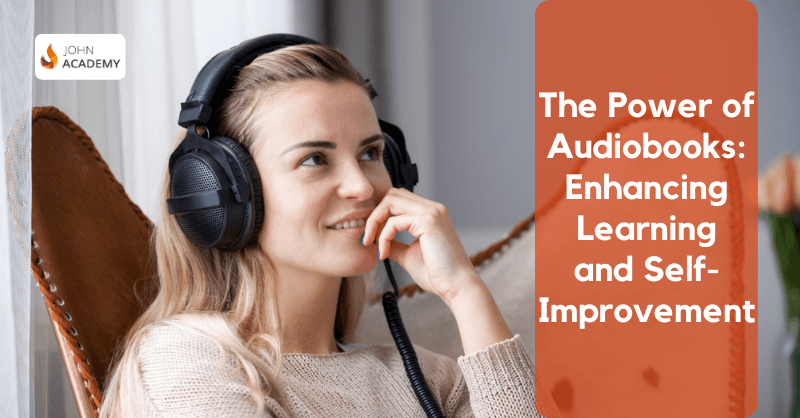
Audiobooks provide a hands-free way to absorb knowledge, dive into stories, and improve language skills while multitasking or resting your eyes. In recent years, audiobook consumption has skyrocketed, with a survey by the Pew Research Center revealing that nearly one in five Americans now listen to audiobooks, a testament to their rising popularity. From supporting mental health to enhancing learning, audiobooks offer various advantages that accommodate busy lifestyles and diverse needs. This article explores the multiple ways in which audiobooks positively impact your life without the hard sell or overwhelming details.
Key takeaways
- Audiobooks promote improved cognitive function, reduce anxiety, and enhance sleep, transforming daily routines into productive learning experiences.
- They support education by helping students with learning disabilities and those learning new languages, making comprehension and language acquisition more accessible.
- With apps like Libby and Hoopla, audiobooks are convenient, portable, and cost-effective through free access from local libraries.
Unveiling the audiobook advantage: A gateway to enhanced learning and well-being
The popularity of audiobooks has surged, not just as an alternative means to experience stories but also as a beneficial tool for mental ease and relaxation. During periods of heightened stress, such as the pandemic era, there was a significant 38% increase in people turning to listening rather than reading books. As we navigate through our heavily digitized lives that can tire out our eyes and impact our psychological well-being, audiobooks offer relief by providing the chance to indulge in literature without straining our vision.
Nestling under a cozy blanket while immersed in an audiobook does more than just entertain. It activates similar parts of the brain that are involved when one is absorbed in print books. This parallels cognitive and emotional involvement with experiencing a good book physically, often leading to improved comprehension levels and seamless integration with multitasking activities. The evolving dynamics between audiobooks and traditional reading spark a nuanced dialogue on ‘reading vs audiobooks‘, exploring how each medium caters to different aspects of our cognitive engagement and lifestyle preferences. Audiobooks thus have transformed routines like morning commutes or household chores into opportunities for enjoyable learning experiences where your mind can revel in stories even when you’re engaged elsewhere.
The science of sound: Boosting brain power with audiobooks
Have you ever considered that tuning into an audiobook is akin to giving your brain a workout? Indeed, this auditory experience actively engages critical regions of the brain such as the hippocampus and frontal cortex, which are essential for memory creation and learning processes. This results in heightened cognitive capabilities because listening to audiobooks enhances auditory processing in the brain, thereby boosting analytical skills and improving recall abilities.
When we engage with audiobooks through focused listening, numerous advantages emerge.
- The reinforcement of attention span and concentration necessary for mental growth
- Intensified emotional reactions that enrich comprehension levels as well as retention capacity
- A form of intellectual stimulation reported by 72% of those who enjoy audiobooks—they feel cognitively invigorated by engaging with this format.
Such benefits mirror what one gains from reading traditionally. They also reflect positive effects on specific cognitive functions, including improved literacy proficiency, a better understanding of textual content, and heightened phonemic awareness—skills crucial for academic development.
Thus it’s clear that audiobooks do much more than serve our need for entertainment. They significantly augment our ability to listen effectively—a skill integral not just in leisurely pursuits but also within educational contexts.
Tuning into health: How audiobooks amplify happiness and reduce negative thinking
Engaging with audiobooks can be an effective form of bibliotherapy and beneficial for one’s mental health. By interrupting destructive thinking patterns and offering captivating narratives, they reduce anxiety symptoms when incorporated into routine listening practices. This presents a strong incentive to immerse oneself in the world of an audiobook through headphones.
By soothing both the eyes and mind, audiobooks have proven helpful in promoting better sleep quality—a key component of overall health maintenance. They deliver engrossing stories that help individuals unwind from daily pressures and combat feelings of isolation—this is particularly true for older adults seeking comfort or company.
Whether pursuing tranquillity for restful slumber or trying to combat pessimistic thoughts, turning to audiobooks emerges as a valuable strategy.
The educational empowerment of audiobooks
Audiobooks serve a significant role beyond providing entertainment or relaxation. They are an invaluable resource for educational purposes.
They enhance reading abilities among students who fall short of their reading benchmarks, assisting them in maintaining academic progress. Audiobooks promote the acquisition of precise word decoding skills by enabling students to discern the clear sounds associated with letters and letter combinations.
By reducing the mental strain on working memory, audiobooks allow readers—particularly those whose reading capabilities are still evolving—to direct greater attention toward comprehension. The opportunity to listen to human-narrated audiobooks expands vocabulary while improving understanding and critical thinking through exposure to a variety of words and material.
For young readers grappling with learning disabilities, audio books present an essential means of connecting their current level of reading skill with their grasp of subject matter content.
Audiobooks as a tool for second-language acquisition
Utilizing audiobooks in the learning process can significantly enhance one’s ability to pick up a foreign language. This approach assists learners by lessening the mental effort needed to decipher written words, thereby sharpening comprehension skills and enabling them to better concentrate on grasping the content.
Listening to audiobooks presents an opportunity for immersion into authentic linguistic patterns, allowing mastery of critical listening and speaking abilities that are essential for attaining fluency and correct pronunciation within a second language.
Learners at varying levels of proficiency find that audiobooks provide a valuable connection with educational materials suited to their grade level through digestible verbal input. While auditory learning may sometimes be undervalued in critiques, it remains an indispensable element of building comprehensive language skills.
Henceforth, integrating an audiobook presented in the desired target language might very well represent a strategic advantage towards overcoming obstacles associated with mastering another tongue.
Levelling the literary playing field: Audiobooks bridging comprehension gaps
Audiobooks can potentially revolutionize learning for students who face difficulties with reading. For those grappling with disabilities like dyslexia, audiobooks can make it easier to enjoy literature and understand intricate ideas by bypassing text decoding challenges.
They also allow these learners to stay in stride academically with classmates and give them a means to tackle sophisticated texts, levelling their understanding up to that of fellow readers.
Listening through audiobooks fosters various literacy skills, including comprehension and decoding abilities. It also bolsters concentration and extends attention spans, which are advantages that are especially valuable for pupils with learning impairments. As a result, audiobooks are a powerful tool for equalizing educational opportunities across diverse student demographics, paving the way for all scholars toward scholastic achievement.
The personal growth pathway: Audiobooks for self-improvement
Personal growth and self-improvement are lifelong journeys, and audiobooks can be your companions along the way. They can be a significant tool for personal development by providing easy access to a broad spectrum of knowledge and skills. Leading personal development experts offer mentorship through audiobooks, providing listeners with motivational advice and insights designed to initiate transformative changes in their lives.
Imagine listening to Stephen R. Covey’s ‘The 7 Habits of Highly Effective People’ and feeling inspired to set clear and achievable personal goals. Or delving into Eckhart Tolle’s ‘The Power of Now’ to learn about positive thinking and living in the present moment. Every audiobook you engage with propels you one step closer to personal growth and self-improvement.
Audiobooks as mentors in your pocket
Imagine carrying around a personal mentor like Amy Cuddy’s ‘Presence’, which teaches confidence techniques ideal for overcoming professional hurdles, in the form of an audiobook. Another example is Jen Sincero’s ‘You Are a Badass’, providing listeners with motivational encouragement and practical advice to foster self-empowerment within their careers. Indeed, numerous audiobooks are readily available to offer guidance on improving organization and productivity—essential elements for climbing the career ladder.
Imagine having access to the insights of thought leaders such as Robert T. Kiyosaki, Barbara Sher, and Malcolm Gladwell through your headphones—as they impart knowledge on financial prosperity, finding passion in one’s work life, and exploring various dynamics that affect success. With just a simple tap or click away from accessing these resources via an audiobook format—they effectively bring invaluable mentorship directly into your pocket.
Cost-effective convenience: Accessing great audiobooks without breaking the bank
Local libraries have unlocked a realm of knowledge at no cost through audiobooks, which are readily accessible via various applications such as Libby, Hoopla, SimplyE, and cloudLibrary.
These applications empower users to check out audiobooks directly onto their own devices from the comfort of their homes. A number of local libraries even allow patrons to apply for an online-only library card that allows them to borrow ebooks and audiobooks without requiring a physical library card.
These apps come loaded with handy features like sample listening opportunities before borrowing books. Reserve titles you’re interested in. And easy management of your loans—all across different platforms ranging from personal computers to smartphones. Thus providing readers with free access points to audio literature, it renders this format not only widely available but also economically feasible.
The library in your earbuds: Making the most of free audiobook services
Many public and university libraries enable the convenience of checking out audiobooks digitally, often by offering online library cards specifically for this purpose. After acquiring your login credentials from your chosen library, you gain access to a range of audiobook apps through an identification process that typically requires a card number and password. Among these popular apps are:
- Libby
- OverDrive
- Hoopla
- Audible
These platforms allow you to explore and borrow audiobooks straight from your local library’s digital collection, making it effortless to enjoy listening to books whenever you’re on the move.
Apps like Libby and Hoopla come with intuitive interfaces which give users the ability to:
- Apply filters or search parameters based on genres, popularity or current availability
- Return borrowed titles before their due date if desired
- Reserve items that are already loaned out
By harnessing the capabilities provided by these applications for digital loans, they grant cost-effective access into novel territories ranging across various genres and authors using either a library card or a subscription service. This offers listeners an expansive scope of possibilities equivalent in measure.
The flip side: Navigating the challenges of audiobooks
Audiobooks present several benefits, yet it’s critical to recognize that listeners may face certain obstacles and downsides. Among these is the difficulty of staying engaged and thoroughly digesting the material while multitasking. Listeners can enhance their focus by employing tactics such as allotting specific times for listening, selecting conducive surroundings for concentration, or making notes to remember important aspects.
Despite these hurdles, adopting effective methods can amplify the rewards of audiobook consumption. It’s essential to identify potential challenges, implement approaches to overcome them effectively and persist in exploring the vast realm that audiobooks have to offer.
Staying engaged: Overcoming distractions while listening to audiobooks
Choosing audiobooks that correspond to personal interests and tastes enhances concentration, improves listening skills and enjoyment, and leads to better engagement. Being open to different genres and narration styles can aid in discovering which audiobooks best capture one’s attention and facilitate focused listening.
Here are some tips for selecting the right audiobook.
- Sample the narrator’s voice and ensure a match with one’s listening preferences before selecting an audiobook.
- Consider the genre and subject matter that interests you.
- Read reviews or listen to sample clips to get a sense of the book’s style and pacing.
By following these tips, you can greatly improve the listening experience and ensure happy listening. So, start listening today!
Pairing audiobook sessions with activities that require minimal mental effort can aid in maintaining a better focus on the audiobook. Here are some activities you can do while listening to audiobooks:
- Household chores
- Crafting
- Exercising
- Gardening
- Cooking
Integrating audiobooks into daily commutes can turn time in transit into productive reading sessions, facilitating efficient time management.
For listeners who find it challenging to focus on audio content alone, engaging in immersive reading by following along with a physical or digital copy of the book can aid concentration and improve listening skills.
Real voices, real impact: Expert insights on audiobook benefits
Listening to audiobooks can be a powerful experience, especially when they are filled with the wisdom of specialists.
Titles such as ‘How to Win Friends & Influence People’ offer listeners valuable guidance in refining interpersonal skills critical for successful networking and achieving objectives. Similarly, Daniel H. Pink’s ‘Drive: The Surprising Truth About What Motivates Us’ provides insights that can help enhance one’s leadership abilities by gaining a better grasp of what drives team members.
When authors like Matthew McConaughey, Billy Connolly, and Sinead O’Connor personally narrate their books, it adds an additional layer to the auditory journey that may deepen the resonance of their messages. An audiobook’s influence is not just about its contents but also about who articulates those words. Having a narrative delivered by a recognizable voice or an esteemed expert can significantly strengthen its impact on the listener.
Educators speak out: How audiobooks change the classroom dynamic
Instructors have recognized the benefits of integrating audiobooks into their instructional strategies. These audio formats support diverse learning styles and bolster comprehension skills. To accommodate students who struggle with reading, educators pair audiobooks with conventional texts, allowing these learners to partake in the same materials and actively participate in class conversations. Students can take paper help services to complete their work within the given deadline and framework.
By offering a captivating and enjoyable auditory experience, audiobooks stimulate greater excitement for reading among students with strong listening skills while minimizing any anxiety related to it. Thus, the focus extends beyond just interpreting printed words. It’s about nurturing an interactive and stimulating educational atmosphere.
Summary
From serving as a tool for enhancing learning and self-improvement to offering cost-effective access to a world of knowledge, audiobooks have transformed how we consume content. Whether it’s for personal growth, educational empowerment, or simply for relaxation and enjoyment, audiobooks offer a versatile and enriching experience. So why not give audiobooks a try? You might just find your new favourite way to read!
Frequently Asked Questions
Is listening to audiobooks beneficial?
Certainly, the practice of listening to audiobooks can enhance one’s understanding of texts, broaden their range of vocabulary, and also assist in preserving memory.
Thus, indulging in audiobooks is not only enjoyable, but it also offers advantages for your well-being!
Why audiobook is better than reading?
Listening to audiobooks provides the advantage of consuming a good book in any setting. It accommodates your hectic lifestyle by allowing you to absorb literature while in transit or engaged in other activities.
This flexibility means that you can experience the joy of a well-crafted story wherever you are!
How can audiobooks assist in learning a second language?
Listening to audiobooks can be beneficial for mastering a second language as they enhance listening comprehension and speaking abilities. They offer an opportunity to hear the natural flow of language and correct pronunciation, which are critical components in achieving fluency in any language.
What are some challenges of listening to audiobooks?
A notable hurdle is the difficulty of focusing and thoroughly taking in the material while listening to audiobooks, especially when engaging in other tasks. Nevertheless, you can cultivate techniques like earmarking specific times for dedicated listening, selecting an environment conducive to concentration, or using note-taking to pinpoint significant details.
How can I access audiobooks for free?
Using apps such as Libby, Hoopla, SimplyE, and cloudLibrary, you have the ability to borrow audiobooks at no cost right onto your devices from local libraries. Certain libraries also provide virtual library cards that enable borrowing online.


